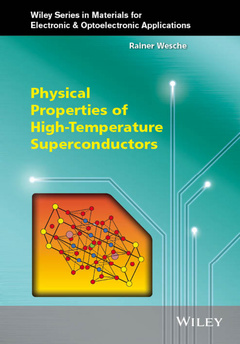Description
Physical Properties of High-Temperature Superconductors
Wiley Series in Materials for Electronic & Optoelectronic Applications Series
Author: Wesche Rainer
Language: English
Subjects for Physical Properties of High-Temperature Superconductors:
Keywords
High-temperature superconductors
544 p. · 17.5x24.9 cm · Hardback
Description
/li>Contents
/li>Biography
/li>
A much-needed update on complex high-temperature superconductors, focusing on materials aspects; this timely book coincides with a recent major break-through of the discovery of iron-based superconductors.
It provides an overview of materials aspects of high-temperature superconductors, combining introductory aspects, description of new physics, material aspects, and a description of the material properties This title is suitable for researchers in materials science, physics and engineering. Also for technicians interested in the applications of superconductors, e.g. as biomagnets
About the Author xi
Series Preface xiii
Preface xv
Acknowledgment xvii
List of Tables xix
Nomenclature xxiii
1. Brief History of Superconductivity 1
1.1 Introduction 1
1.2 Milestones in the Field of Superconductivity 1
1.2.1 Early Discoveries 1
1.2.2 Progress in the Understanding of Superconductivity 4
1.2.3 Discovery of High-Temperature Superconductivity 4
1.2.4 Importance of Higher Transition Temperatures for Applications 6
2. The Superconducting State 13
2.1 Introduction 13
2.2 Electrical Resistance 13
2.3 Characteristic Properties of Superconductors 22
2.4 Superconductor Electrodynamics 30
2.5 Thermodynamics of Superconductors 34
3. Superconductivity: A Macroscopic Quantum Phenomenon 45
3.1 Introduction 45
3.2 BCS Theory of Superconductivity 45
3.3 Tunneling Effects 52
4. Type II Superconductors 69
4.1 Introduction 69
4.2 The Ginzburg-Landau Theory 70
4.3 Magnetic Behavior of Type I and Type II Superconductors 73
4.4 Critical Current Densities of Type I and Type II Superconductors 81
4.5 Anisotropic Superconductors 83
5. Cuprate Superconductors: An Overview 87
5.1 Introduction 87
5.2 Families of Superconductive Cuprates 88
5.3 Variation of Charge Carrier Density (Doping) 93
5.4 Summary 96
6. Crystal Structures of Cuprate Superconductors 101
6.1 Introduction 101
6.2 Diffraction Methods 102
6.2.1 Bragg Condition 102
6.2.2 Miller Indices 102
6.2.3 Classification of Crystal Structures 103
6.2.4 X-ray Diffraction 104
6.2.5 Neutron Diffraction 106
6.3 Crystal Structures of the Cuprate High-Temperature Superconductors 107
6.3.1 The Crystal Structure of La2CuO4 107
6.3.2 The Crystal Structure of YBa2Cu3O7-delta 108
6.3.3 The Crystal Structures of Bi-22(n-1)n High-Temperature Superconductors 111
6.3.4 The Crystal Structures of Tl-based High-Temperature Superconductors 113
6.3.5 The Crystal Structures of Hg-based High-Temperature Superconductors 121
6.3.6 Lattice Parameters of Cuprate Superconductors 124
7. Empirical Rules for the Critical Temperature 131
7.1 Introduction 131
7.2 Relations between Charge Carrier Density and Critical Temperature 132
7.3 Effect of the Number of CuO2 Planes in the Copper Oxide Blocks 135
7.4 Effect of Pressure on the Critical Temperature 138
7.5 Summary 146
8. Generic Phase Diagram of Cuprate Superconductors 151
8.1 Introduction 151
8.2 Generic Phase Diagram of Hole-Doped Cuprate Superconductors 151
8.2.1 Generic Phase Diagram: An Overview 151
8.2.2 Symmetry of the Superconducting Order Parameter 153
8.2.3 The Pseudogap 158
8.3 Summary 161
9. Superconducting Properties of Cuprate High-Tc Superconductors 165
9.1 Introduction 165
9.2 Characteristic Length Scales 166
9.3 Superconducting Energy Gap 169
9.4 Magnetic Phase Diagram and Irreversibility Line 171
9.5 Critical Current Densities in Cuprate Superconductors 174
9.5.1 Definitions of the Critical Current 174
9.5.2 Critical Currents in Polycrystalline Cuprate Superconductors 178
9.5.3 Critical Currents in Bulk Cuprate Superconductors 182
9.5.4 Critical Currents in Superconducting Films 183
9.6 Grain-Boundary Weak Links 188
9.7 Summary 193
10. Flux Pinning in Cuprate High-Tc Superconductors 203
10.1 Introduction 203
10.2 Vortex Lattice 204
10.3 Consequences of Anisotropy and Intrinsic Pinning 205
10.4 Thermally Activated Flux Creep 207
10.5 Irreversibility Lines 216
10.6 Summary 224
11. Transport Properties 231
11.1 Introduction 231
11.2 Normal-State Resistivity 232
11.3 Thermal Conductivity 249
11.4 Summary 256
12. Thermoelectric and Thermomagnetic Effects 265
12.1 Introduction 265
12.2 Thermoelectric Power of Cuprate Superconductors 269
12.3 Nernst Effect 273
12.4 Summary 276
13. Specific Heat 279
13.1 Introduction 279
13.2 Specific Heat at Low Temperatures 280
13.3 Specific Heat Jump at the Transition to Superconductivity 284
13.4 Specific Heat Data up to Room Temperature 287
13.5 Summary 289
14. Powder Synthesis and Bulk Cuprate Superconductors 293
14.1 Introduction 293
14.2 Synthesis of Cuprate Superconductor Powders 294
14.2.1 Yttrium-based Superconductors 294
14.2.2 Bismuth-based Superconductors 296
14.2.3 Thallium-based Superconductors 303
14.2.4 Mercury-based Superconductors 311
14.3 Bulk Cuprate High-Tc Superconductors 317
14.3.1 Introduction 317
14.3.2 Bi-2212 and (Bi,Pb)-2223 Bulk Superconductors 317
14.3.3 RE-123 Bulk Superconductors 320
14.4 Summary 326
15. First- and Second-Generation High-Temperature Superconductor Wires 339
15.1 Introduction 339
15.2 First-Generation High-Tc Superconductor Wires and Tapes 340
15.2.1 Introduction 340
15.2.2 Ag/Bi-2212 Wires and Tapes 341
15.2.3 Ag/Bi-2223 Tapes 351
15.3 Second-Generation of High-Tc Superconductor Tapes 361
15.3.1 Introduction 361
15.3.2 Manufacturing Routes for Coated Conductors 362
15.3.3 Critical Current Densities of Coated Conductors 370
15.3.4 Lengthy Coated Conductors 379
16. Cuprate Superconductor Films 393
16.1 Introduction 393
16.2 Film Deposition Techniques 394
16.2.1 Preparation of Bismuth-based Cuprate Superconductor Films 394
16.2.2 Preparation of Thallium-based Cuprate Superconductor Films 394
16.2.3 Preparation of Mercury-based Cuprate Superconductor Films 397
16.2.4 Preparation of RE-123 Superconductor Films 404
16.3 Multilayers of Ultrathin Films 407
16.4 Strain Effects 412
16.5 Summary 416
17. MgB2 - An Intermediate-Temperature Superconductor 423
17.1 Introduction 423
17.2 Physical Properties of MgB2 424
17.3 MgB2 Wires and Tapes 437
17.4 MgB2 Bulk Material 444
17.5 MgB2 Films 446
17.6 Summary 450
18. Iron-Based Superconductors - A New Class of High-Temperature Superconductors 459
18.1 Introduction 459
18.2 Critical Temperatures of Iron-based Superconductors 461
18.3 Crystal Structures of Iron-based Superconductors 467
18.4 Physical Properties of Iron-based Superconductors 471
18.5 Synthesis of Iron-based Superconductors 477
18.6 Critical Current Densities in Iron-based Superconductors 477
18.7 Summary 482
19. Outlook 489
19.1 Introduction 489
19.2 The Investigation of Physical Properties 490
19.3 Conductor Development 491
19.4 Magnet and Power Applications 492
Author Index 497
Subject Index 501

